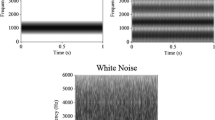Summary
This paper is on the perception of transient sounds whose sound energy has a global inbalance on the temporal dimension. From previous studies, the loudness of such sounds can be approximated by their mean energy level. Systematic deviations from this approximation were examined here. Intensity increment sounds consisting of two sound-pressure levels were used in all the experiments. In the first experiment, the stimulus sounds were of an equal duration (800 ms) and a nearly equal mean energy level (73.4 dBA). The loudness of these sounds was measured by magnitude estimation without assigned modulus. As a result, the sounds were louder when the level of the onset portion was higher or when the level difference within the sounds was smaller. No positive effects of the maximum level appeared. In the second experiment, the total duration of the stimulus sounds was varied from 400 ms to 1600 ms, and sounds including considerably long increments were also used. The conclusion of the first experiment was supported except when the increment duration or the whole duration was long. Finally, the loudness differences within increment sounds were estimated. Subjective ‘loudness differences’ were judged directly by the subjects and decided mostly by the level difference within the sounds. In conclusion, effects caused by the following physical variables were found: (1) onset level and (2) level difference within the sounds.
Similar content being viewed by others
References
Bauch H (1956) Die Bedeutung der Frequenzgruppe für die Lautheit von Klängen. Acustica 6:40–45
International Electrotechnical Commission (1973) First supplement to Publication 179: Precision sound level meters: Additional characteristics for the measurement of impulsive sounds. Publication 179A
Kumagai M, Ebata M, Sone T (1981) Effect of some physical parameters of impact sound on its loudness (A study on the loudness of impact sound. I). J Acoust Soc Jpn (E) 2:15–26
Kuwano S, Namba S, Kato T (1978) The loudness of impulsive sound. J Acoust Soc Jpn 34:316–317
Marks LE (1974) Sensory processes: The new psychophysics. Academic Press, New York
Namba S, Kuwano S (1981) Effect of temporal pattern of impulsive sounds on loudness. Stud Hum Soc Sci (Col Gen Ed, Osaka Univ) 29:1–15 (In Japanese with English summary)
Namba S, Kuwano S (1982) Psychological study on Leq as a measure of loudness of various kinds of noises. J Acoust Soc Jpn 38:774–785 (In Japanese with English summary)
Namba S, Kuwano S, Kato T (1976) The loudness of sound with intensity increment. Jap Psychol Res 18:63–72
Namba S, Kuwano S, Kato T (1978) An investigation of Leq and Lα in relation to loudness. J Acoust Soc Jpn 34:301–307 (In Japanese with English summary)
Namba S, Nakamura T, Yasuda S (1972) The relation between the loudness and the mean of energy of level-fluctuating noises. Jap J Psychol 43:251–260 (In Japanese with English summary)
Namba S, Nakamura T, Yasuda S (1973) PSCS: Programmable Sound Control System. Jap J Psychol 43:307–311 (In Japanese)
Scharf B (1978) Loudness. In: Carterette EC, Friedman MP (eds) Handbook of Perception, Vol IV: Hearing. Academic Press, New York
Schöne P (1979) Messungen zur Schwankungsstärke von amplituden-modulierten Sinustönen. Acustica 41:252–257
Spreng M (1980) Influence of impulsive and fluctuating noise upon physiological excitations and short-time re-adaptation. Scand Audiol Suppl 12 (Proceedings of the International Symposium on Effects of Impulse Noise on Hearing, Malmö, 1980)
Stephens SDG (1974) Methodological factors influencing loudness of short duration sounds. J Sound Vib 37:235–246
Stevens SS (1957) On the psychophysical law. Psychol Rev 64: 153–181
Stevens SS (1975) Psychophysics: Introduction to its perceptual, neural and social prospects. Wiley, New York
Zwicker E (1977) Procedure for calculating loudness of temporally variable sounds. J Acoust Soc Am 62:675–682
Author information
Authors and Affiliations
Rights and permissions
About this article
Cite this article
Nakajima, Y., Kuwano, S. & Namba, S. The effect of temporal patterns of sound energy on the loudness of Intensity increment sounds. Psychol. Res 45, 157–175 (1983). https://doi.org/10.1007/BF00308667
Received:
Issue Date:
DOI: https://doi.org/10.1007/BF00308667




